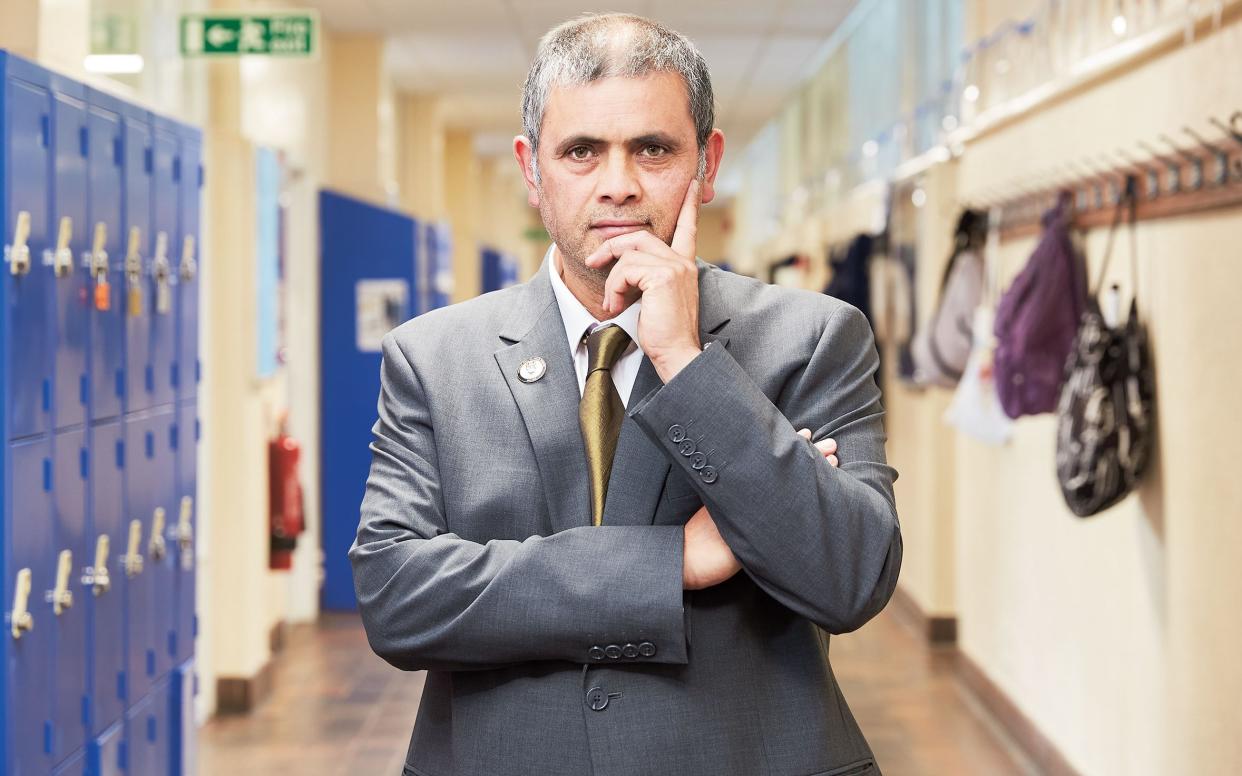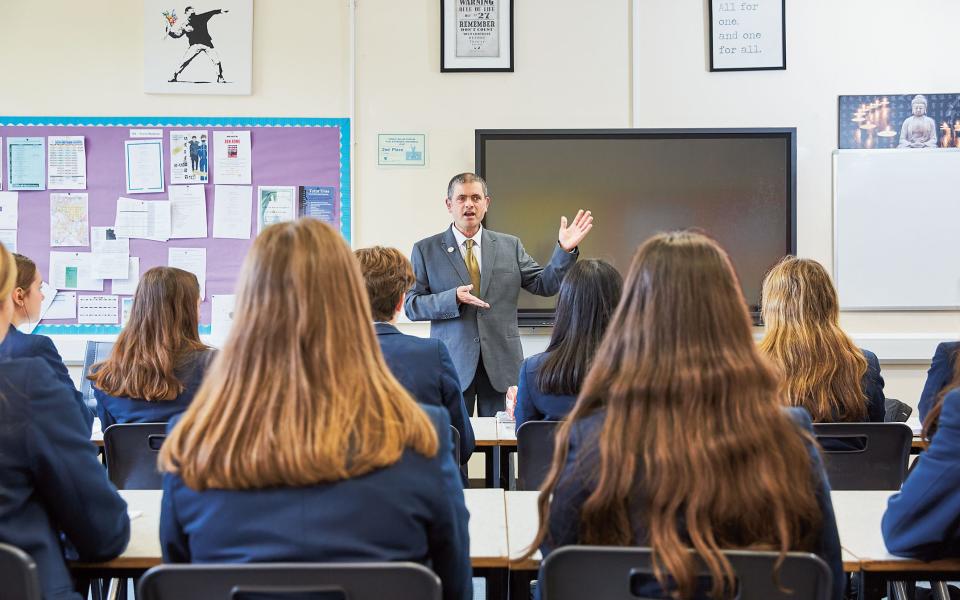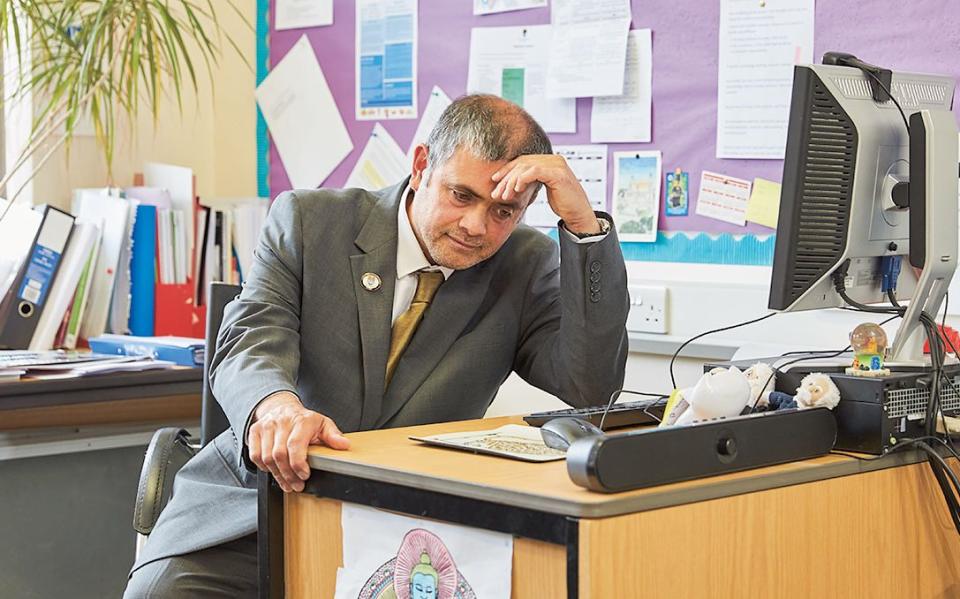Diary of a battle-worn grammar school head: 'Students were screaming, girls were crying'

Two years after becoming a deputy head I attempted to fulfil my quest by going for the big one: head of Torquay Girls’ Grammar School. This was my chance to do things my way and really make a difference. I spent months furiously planning but in the end, nothing prepared me for what was to come when the starting gun fired on 1 September 2007.
The enormity of it all hit me as I was outlining my vision to parents. Most nodded in general agreement, satisfied that I had at least thought about it. However, for one rather intense mother, this was not enough. When precisely, she asked, would I achieve this vision? This threw me.
‘Maybe by my third year?’ I answered, which placated her.
The truthful answer was: ‘We will never achieve it. Despite our best intentions someone will always be left behind.’ However clear your vision, it’s hard to make it a reality because the blood and guts of everyday school life gets in the way, and because government policy is built on shifting sands.
During my 14 years as a head, I served under six education secretaries, five of whom lasted less than three years. This hasn’t stopped each from trying to impose their ideas. What schools need are prolonged periods of stability but we have experienced the opposite from the DfE, whose motto is ‘Mutatio est nostrum modo constant’ – change is our only constant. As I discovered first-hand while at the helm of Torquay – and eventually it got the better of me.
October 2007
The behaviour at Torquay Grammar was not quite as I’d imagined. During my first assembly, the Year Elevens unashamedly talked while I was speaking. In the end I rebuked the whole year group, a necessary but exceedingly awkward course of action, far removed from the positive message I’d hoped to deliver.
That afternoon, while popping into lessons to get a feel for the school, I witnessed one of those Year Elevens being rude to her physics teacher during an astronomy lesson. As well as being generally disruptive, she shouted out the old classic, ‘How big is Uranus, Miss?’
I asked her to step outside, expecting contrition and an apology. Instead, she ranted: ‘This is our school, not yours. Who do you think you are?’

Later in the year, I heard the head of Year Eight spend a good 10 minutes of assembly outlining the type of earrings compliant with my newly imposed behaviour and uniform code. If she felt comfortable dedicating this much time to this level of transgression, other things, I concluded, must be fine.
Still, expectations of behaviour have changed, as was highlighted when some visiting ‘old girls’ recounted the misdemeanours regarded as major crimes in the 1940s. If they were seen removing their beret on the bus or walking on the wrong side of the corridor, they were clapped into detention. Talking during a lesson was such a heinous transgression that they were sent to stand in the entrance hall, normally strictly out of bounds. Even now, they hover at the front door looking jittery, unsure if the rule still applies.
June 2008
Keen to make my mark, I upgraded school signage, organised a parents’ Curry and Quiz Night and provided a tea lady in the staffroom. Unfortunately, an end-of-year parents’ survey confirmed there was still work to be done, as one simply wrote: ‘The Head is a lightweight.’ After less than a year in post, this seemed harsh, but I redoubled my efforts.
October 2008
Mrs Rumbold*, the formidable head of sixth form, was a no-nonsense matriarch who taught classics. She was about to retire but one day she nearly left us in spectacular fashion.
The secretary called to say there had been an incident in the sixth form centre and I dashed there, only to be met by a ghost. Mrs Rumbold had been sitting at her desk drinking coffee when she heard a crack above her head. Before she could react, the whole ceiling had collapsed. She emerged, covered in white plaster dust and clutching a rubble-filled mug. Two passing sixth formers asked if she was OK. ‘Yes, thank you, girls,’ came Mrs Rumbold’s curt reply. ‘And Grace, that top you are wearing is not school uniform.’
November 2008
Danger is inherent in many old school buildings but the biggest danger is the students themselves: they slip on the slightest bit of ice, trip over their bags, some seem to trip on thin air. They collide with friends, accidentally whack each other with hockey sticks, super-glue their fingers together. And then there is the danger of school trips…
June 2009
The hysterical phone call came one Friday afternoon. ‘Is that Dr Smith? Oh, thank God. It’s Darcy Blunt*. I’m in Paris and Ruth Adams* has been hit by a bus,’ she sobbed.
It took five minutes to calm her down and extract the details: during scheduled shopping time, Ruth had stepped into the path of a bus and been knocked unconscious for several minutes, sustaining a head injury. Someone had called an ambulance that whisked her to hospital, leaving Darcy alone: she didn’t know which hospital Ruth was in and couldn’t get hold of the teachers (a presidential visit had affected mobile signal in the area), nor find her way back to them.
We quickly turned the office into an impromptu incident room. A French teacher rang around the major Paris hospitals, while I directed Darcy, who was lost somewhere off the Champs-Elysées, back to the teachers.
Luckily, Ruth’s injuries weren’t life threatening; when she returned her main concern was that she’d missed out on visiting Disneyland Paris.

November 2010
The Big Year Seven Sleepover was a well-intentioned idea that went horribly wrong. My deputies pointed out the obvious flaw: if you put 120 adolescents in a hall overnight, they won’t sleep. But I forged ahead, thinking that Year Seven could do with a bit more bonding. In my mind’s eye, proceedings would conclude at 11pm, with them tucked into their sleeping bags with a hot chocolate.
I knew things had gone awry at 9pm when I arrived back at school from another event. Corridors were strewn with rubbish, students ran around screaming, two girls were crying in a corner. Mr Charlwood, who had compèred the quiz, looked shell-shocked as he told me that they had consumed unfeasibly large quantities of sweets and energy drinks. The quiz had been manic, with answers shouted out and rival teams falling out.
It was 2.30am before they quietened down, and I could finally retire to sleep in the PE room, sadly without my top-of-the-range duck-down sleeping bag. One of the girls had forgotten hers, so (begrudgingly) I’d loaned her mine.
I fashioned a bed out of my coat on the cold, hard floor. Whenever I moved a sensor turned on the light but two hours later, I finally drifted off to the sound of someone sobbing. Twenty minutes later I was woken again: the sobbing girl’s mum had arrived to take her home. It was 5am.
I put it all down to a terrible mistake – I’d listen to my deputies in future – but the next week I received a letter:
Dear Dr Smith, I would like to thank you for lending me your sleeping bag at the Big Sleepover. I am extremely grateful for your kindness. I wanted to express my gratitude by doing a letter. You were there in my hour of need and you are a fabulous headmaster. Sincerely, Isabelle
What a perceptive young girl! I had a feeling she would go far.
April 2011
The beginning of austerity measures in the UK. If only I’d known what a financial bonanza the previous three years had been in comparison. We couldn’t buy the latest textbooks, couldn’t afford to fix the leaky roof and had to axe subjects like design and technology at a time when schools were accused of not doing enough to encourage girls into this area. I found myself repeatedly asking parents to donate money for replacement computers, minibuses and sports equipment.
The only way to generate more income was to retain your own students – and steal more from other schools. This meant that students were bombarded by charm offensives from competing schools, and more of my time was taken up with producing a glossy prospectus and commissioning promotional videos.
We put on all-singing-and-dancing open evenings, gave out school badges like confetti and offered potential sixth formers personal tablets, free gym membership and everything short of guaranteeing three A*s at A level. It’s not what the public purse should be used for, but schools had to use all means available to survive.
However, there was a rather unfortunate end to one particular school tour. Despite my best efforts, a couple of parents still looked sceptical, so I accompanied them to the entrance but while I was talking, something behind me caught their attention. At the same time came a strong, unmistakable smell of cannabis. The parents looked at each other and abruptly left.
I turned around and there, on the grass verge behind me, was a cluster of condoms. These were the innocent residue of Year Eleven’s last-day shenanigans when they had been blown up to decorate our school sign. The cannabis cloud, meanwhile, came courtesy of a neighbour who used the shed at the end of his garden for ‘relaxation’.
Desperate, I considered chasing after the parents to explain. Instead, I moved closer to the shed, took several deep breaths. Suddenly I felt a whole lot more relaxed about losing the sale.
July 2011
I first encountered Sabrina Petersen* during the annual sponsored walk. She and her friend were lagging and, as designated ‘sweeper’, there was no way of escaping their rambling conversation, which covered such weighty topics as: whether pink or white marshmallows taste nicer and the last time they had stepped in dog mess.
For five hours, their continuous stream almost finished me off. If these were the typical thoughts of all Year Eights, surely the future well-being of the nation was in doubt.
Five years later, during mock Oxbridge interviews, I came face to face with Sabrina again, and was intrigued to see she was applying to read politics at Cambridge. Our panel set-up was intimidating but Sabrina appeared assured and I wondered how long until this faux confidence ebbed away. As the first question was asked, ‘Should a political party define ideology, or should ideology define the party?’ I braced myself.
Oh, me of little faith! It was a good few minutes before Sabrina eloquently drew the strands of her argument to a conclusion and we were able to catch our breath; her masterful delivery blew us away. We fired more difficult questions at her but there was nothing she could not riposte with ease. Afterwards, we all agreed that she would most likely next come to our attention as a member of the Cabinet.
July 2014
My first seven years had passed in the blink of an eye. My original Year Sevens had experienced their entire secondary education under my leadership. Our academic results had improved considerably too; in 2011, Ofsted had upgraded us to ‘outstanding’. However, there were hurdles at every turn: DfE interference, mountains of administration, parental complaints, staffing issues and a daily inbox of nonsense. Seeds of resentment with the system began to take root in my mind.
April 2015
On the wall in my office hung a picture of Napoleon crossing the Alps on horseback, his posture victorious. As this term seemed to have gone well, I secretly dared to liken myself to this great leader, spurring my troops on to greater things – brilliant, indestructible, flawless.
Luckily, in education you are never far from something that will bring you rudely back down to earth and remind you not to be a conceited arse… For me, this was a calamitous assembly.
I genuinely enjoy giving assemblies. You get to be the centre of attention, tell some humorous anecdotes and, unlike in my social interactions where people tend to move off when I start talking, the audience is trapped. This particular morning I was trying to raise spirits at the end of a busy term. What I meant to say was, ‘We have all had a ridiculous amount of success recently.’ Unfortunately, what came out was: ‘We have all had a ridiculous amount of sex recently…’ Quickly followed by: ‘Success. Success. A ridiculous amount of SUCCESS.’
There was a short pause, then the hall erupted. They shrieked and hooted, while I fixed a neutral expression on my face and stared at my speech.
Shortly afterwards, I replaced my Napoleon painting with a different one of him, slumped in a chair alone and out of shape. Disappointment and anger can be read on his face. His downfall is looming, the destruction of his empire has been decided. I find this picture really helps to keep me grounded.
October 2015
One Monday morning in the autumn term, two large boxes of chicken kievs mysteriously disappeared from the kitchen. We will probably never know the fate of those 32 chicken fillets but there was a considerable difference of opinion among staff over who had taken them, with accusations flying. The ensuing investigation involved witness statements, a timeline, a stocktake, interviews with chief protagonists and their union reps, a tour of the walk-in freezer and the scanning of CCTV footage. The investigation report compelled me to set up a governors’ hearing, which took a full morning. After all of this, there was no evidence to charge anyone.
Once again, more time had been wasted. The kievs were still missing and none of this had made an iota of difference to the education of our students.
June 2016
A recurring belief of older generations is that growing up nowadays is far easier. After a fractious holiday with my children, I became a paid-up member of this school of thought and delivered an assembly on the subject, explaining how I’d had things tougher: I’d been fed a diet of beef dripping not kale and quinoa, and unlike them, hadn’t received constant technological stimulation. Instead I had to learn to amuse myself for hours with something as simple as a stick.
Halfway through, it dawned on me that something terrible had happened: I had morphed into my father. Even my hands were clasped in an identical pose. It happens to us all but it’s still a shock to discover you have become an irritating old fart. There was no coming back, though I did briefly consider growing a hipster beard.
The more I considered all of this, the more I realised that the younger generation are under greater mental strain than we ever were. Our students are the first generation born into a digital age. They have no escape from addictive, 24-hour online culture or relentless peer judgment via social media. Many lack the stability that faith and family previously provided. Physically, things are no better, with rising childhood obesity and diabetes.
Attempts to counter this resulted in an explosion of support personnel: suddenly we employed all sorts of pastoral heads, counsellors, safeguarding officers, mental health practitioners, student mentors, catch-up coordinators – but it was never enough.
I decided to implement a ‘health curriculum’, based on the work of geographer Dan Buettner who had identified the five ‘blue zones’, or places where people live the longest and have low levels of chronic disease – Japan, Italy, Greece, Costa Rica and California. All had certain habits in common: family was priority; they set aside daily time to escape the commotion of life; they ate moderate amounts of fresh, unprocessed produce; they did not go to the gym or run marathons as their exercise came from movement in their daily lives.
Our modified version of the blue zone habits involved replicating a quarter-mile circuit through our grounds – students were expected to walk around it a certain number of times each half-term. We provided tai chi and yoga, offered blue- zone food choices in the canteen, we started a gardening club, even mid-lesson movement sessions, and we asked students to form social support groups with four friends, based on the lifelong friendship groups in Japan known as moai.
Our programme gathered some interest and we were asked to present at conferences. However, the wholescale adoption of this sort of curriculum is problematic, as it requires funding and the freedom to escape the straitjacket of an exam-orientated curriculum. Still, if it was implemented country-wide, it would be the single most important investment a government could make.
March 2020
On 20 March, UK schools closed down in response to the pandemic. My daughter had Covid-19 symptoms, so I moved into a house on the school site that we used as the base for outdoor education, and from here managed on-site provision for key worker children.
After several days of rattling around an empty school, things started to affect me in a way reminiscent of Jack Nicholson in The Shining. I started a regular Friday Pandemic Bulletin, designed to keep staff informed of what was happening back at mothership, which inadvertently charted this mental decline. One was signed off: ‘That’s all for now, as I have to go. I think something exciting might be happening in the corridor – it looks like one of the lights has started to flicker. Dr Smith’
The DfE’s response to the Covid crisis, meanwhile, heralded in a golden age of educational mismanagement, characterised by eleventh- hour announcements, policy flip-flops and an impenetrable tsunami of rules and guidance, often calling for immediate action.
One day we were dividing the site into seven separate bubbles for each year group, the next we were converting the exam hall into a field hospital. Then we were informed that summer exams would be replaced by ‘teacher assessed grades’ – but guidance didn’t arrive for three months, leaving teachers just 12 weeks to complete this monumental task.

I had begun my headship keen and eager to please but over time my attitude towards the decision-makers at the DfE and Ofsted had become increasingly belligerent. Even before the pandemic, the relentless stream of half-baked strategies and bungled initiatives had left me punch-drunk. I was battle weary. And by the end of the summer, I reached crisis fatigue.
Headteachers felt like lions being led by donkeys, any faith I’d had left in the authorities having been shot through. The final straw came when I came across an old newspaper article written about me shortly after being appointed. The person staring out of the page looked ridiculously optimistic. The person staring back from the mirror every morning did not. Now was a good time to pass the baton to someone with fresh energy.
In September 2020 I notified the chair of governors of my intention to retire at the end of the academic year: I would twist and turn to the tune of the DfE and Gavin Williamson no more; this old git was no longer for turning.
Ultimately, I never managed to become the ‘hero head’ I’d set out to be – I came nowhere near, really, but I don’t think I ever realistically stood a chance. It would be easy to conclude that being a headteacher is simply not worth the trauma but, despite the frustrations and the government meddling there are many glorious reasons why it absolutely is.
The best school motto I have seen is ‘Work Hard, Be Kind’. It says it all really. If you can instil this in your students, everything else is a bonus.
*Some names have been changed
Head Trauma: The Bruising Diary of a Headteacher, by Nick Smith, is out on 18 August (Michael O’Mara, £16.99); pre-order a copy now at the Telegraph Bookshop

 Yahoo News
Yahoo News 
